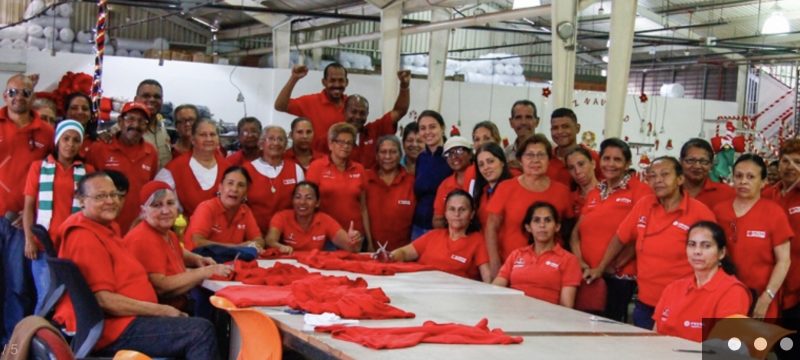Almost 600% Raised Communal Textile Production in 2018


Orinoco Tribune – News and opinion pieces about Venezuela and beyond
From Venezuela and made by Venezuelan Chavistas

In the National Textile and Footwear Company, located in the Fabricio Ojeda Endogenous Nucleus, they implemented the “punto y circuló” methodology effectively.
Under the concept of being an inclusive and productive model, Enatexca (Empresa Nacional de Textil y Calzados) worked hard in the social production and now that they have just arrived at their fifteen years, they guarantee a link with 24 communal companies that, together with their workers, cover the demands of uniforms and industrial/school clothing, under the sponsorship of PDVSA Industrial, chaired by Mailing Perdomo.
They are located in the Fabricio Ojeda Endogenous Production Nucleus, where they share spaces with a health module, a rehabilitation module, a building of the Ribas Mission, a command of the Bolivarian Militia and several centers of urban agriculture producers, from where the community of Gramovén is located in the Sucre municipality.
María Eugenia López Cano, president; Adelaida Falcón, general manager; José Luis Bolívar, production manager and Jesús Rodríguez, warehouse manager, whose management is a fundamental part of the point-and-circle system proposed by Commander Hugo Chávez to deepen the philosophy that the organized community generates its own production companies social, EPS, to self-supply and improve the services required.
Unstoppable Production
Enatexca speakers say that this year they exceeded production by 577% compared to 2017 and attribute it to partnerships with the community and with 24 EPSs and cooperatives that work throughout the Gran Caracas, even in the Valles del Tuy and Maracay (each employs at least 10 to 15 workers).
The annual production capacity described by President López Cano: panties at 69,699; classic shirts at 92,800; chemisses in 116 thousand; flannels in 232 thousand; industrial jeans at 92,800; aprons, sleeves and leggings for welders at 69,600; plus 46,400 pairs of safety boots that due to lack of raw material will see its production restart in 2019.
With respect to the plan of school uniforms 229,739 pieces were made this year, apart from a specific production for communal gas of 53 thousand pieces between jeans and flannels.
Everything is covered with national suppliers, who comply with the delivery of cotton, fabrics and threads made in Venezuela, to activate more than 90 machines that make daily life in Gramovén.
Of the 166 permanent workers, who are covered by the Organic Labor Law for Workers (LOTTT), plus benefits of hiring, seniority, experience and degree of training, less than 15% is administrative. The day to day of the workforce goes from 8 to 12 in the morning and 1 to 5 in the afternoon, to meet the production goals that are governed by the requirements of Pdvsa Industrial.
Successful inclusion
In the opinion of those who run this EPS, success is guaranteed because a large part of its workers have been trained according to their needs in programs supervised by Inces, in addition to being inhabitants of the area and growing together with the company, which increases the sense of belonging and care for the facilities and their work machinery.
There they receive and select fabrics, make, design, cut, sew, apply quality control, package and dispatch, with the highest delivery and efficiency.
This system of work managed to engage and involve women and men of the third age [elders] and young people who have been trained in Enatexca and proudly celebrate each production cut.
Apart from the fact that a group of workers were benefited by the Great Housing Mission Venezuela [subsidized houses] , all have just received the food combo plus the Christmas combo for the hallacas [Venezuelan tamales, a traditional Christmas dish], in addition to two pork legs per worker, and they assure that they are close to acquiring the meat combo and the one of personal hygiene.
The integration bets high and in their spare time, some work as barbers and others are dedicated, under the command of Víctor Armao, to the cultivation of vegetables and grains to supply their own homes.
In this way, 2019 is faced with new production challenges, which means that they need to increase their payroll, which guarantees more productive employment for the inhabitants of the sector who are trained and who wish to join the communal work.
Source URL: Ciudad CCS
Translated by JRE